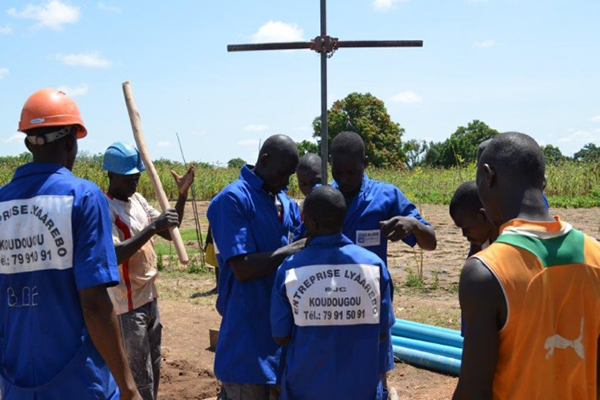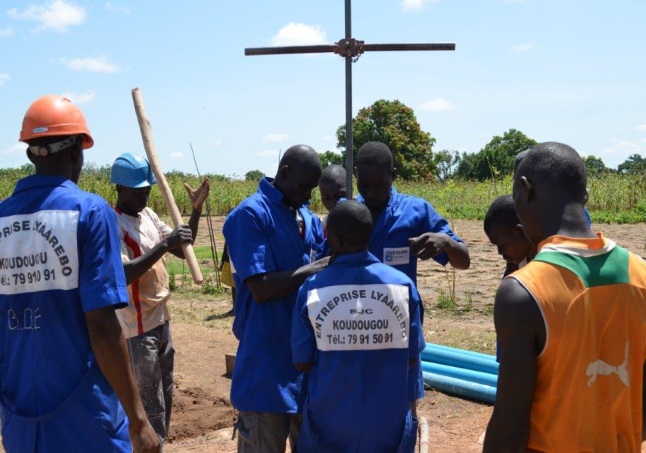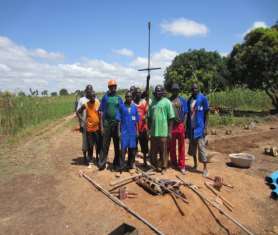
Multiple–use water services meet local needs for clients and create jobs for local private enterprises

Multiple use water services (MUS) is an approach for planning and designing water services that addresses not just one aspect of people’s water needs – such as drinking or growing crops – but the range of people’s domestic and productive water needs. Winrock International is implementing the MUS component of the USAID WA-WASH program and simultaneously supporting the value-chain for water-related products and services so that Burkinabé clients will have access to affordable water solutions adapted to their context, not only now but long into the future.
Mr. Bado is a Burkinabé entrepreneur with experience digging hand-dug wells in his village (Koukouldi, located in the Centre Ouest region of Burkina Faso). He was identified by Winrock
International as a local service provider who could be trained and equipped to provide water solutions to clients, addressing their needs for both domestic and productive water.
Between December 2012 and March 2013, Mr. Bado and his four-person drilling team participated in two training workshops funded by USAID WA-WASH. The first workshop trained the team on a technique to deepen and upgrade traditional wells by drilling low-cost boreholes inside the well. In the second training, the team learned how to deepen and reinforce wells using concrete rings. After the training, Mr. Bado invested $400 to purchase his first set of drilling equipment. He named his enterprise “Lyaarebo” in the local Gourounsi language, meaning “the fatigue is reduced, the work is improved.”
Only six months later, in October 2013, the Lyaarebo enterprise has drilled 20 boreholes inside existing wells in the Koukouldi area. On top of these upgraded wells, Mr. Bado’s team has installed pumps and concrete covers. At an average rate of one borehole per week, Mr. Bado’s team has improved the quantity of water (important for productive uses such as gardening), the quality of water (important for drinking and health), and year-round reliability of water (important for both domestic and productive needs) for his clients.
The USAID WA-WASH program is facilitating market development through demonstration sites of these affordable water solutions. Mr. Bado has begun increasing the size of his team in anticipation of increasing demand from clients. He has recruited and trained six interns and is adding a second set of drilling equipment.
Mr. Bado sees several reasons for the increasing demand for his water solutions. According to him, the deepened, reinforced, and covered wells provide: reliable access to water even during
seasons when traditionally dug wells run dry; improved safety for children due to well covers;
and potable water for good health. These low cost technologies meet clients’ needs for multiple uses of water for small livestock, building businesses, growing gardens, and drinking.

The credit for this expanding market is not entirely due to the services Mr. Bado delivers but
also to his own business acumen. First, Mr. Bado uses good commercial tools and provides high
quality drilling services to his clients, ensuring that a broken pump is immediately fixed. Understanding that women often initiate family investment in water solutions, Mr. Bado meets with community women to advertise his products. Second, Mr. Bado provides additional value to his clients. For example, he suggests how to divert runoff water from shower rooms, how to improve groundwater recharge around the well with soil dikes, and how to dig through difficult laterite soil to make holes for fruit tree planting. Finally, Mr. Bado’s business benefits from the relationship and trust he builds with his employees. For example, he encourages his employees to open a savings account and he provides credit to assist with large investments, such as motorbike purchases. As a result, Mr. Bado says that more and more young men approach him for employment opportunities. These young men have seen the positive behavior change of Lyaarebo’s employees as they become more responsible. They also see an opportunity to earn an income at Lyaarebo Enterprise and invest it in inputs to increase vegetable production in their gardens.
“Before, I was a regular hand-dug well digger but now I am a professional manual driller with a
regionally-recognized team,” says Mr. Moise Bado, summarizing the recent transformation of
his enterprise.
In the short term, Mr. Bado’s enterprise will help meet the USAID WA-WASH Program’s goal of affordable water solutions for domestic and productive uses that are adapted to the real needs of the population. In the long term, Mr. Bado and his Lyaarebo employees are positioned to
sustain their businesses and continue to reduce the work load of their clients by providing them with appropriate low cost technolgoies, for years to come.
